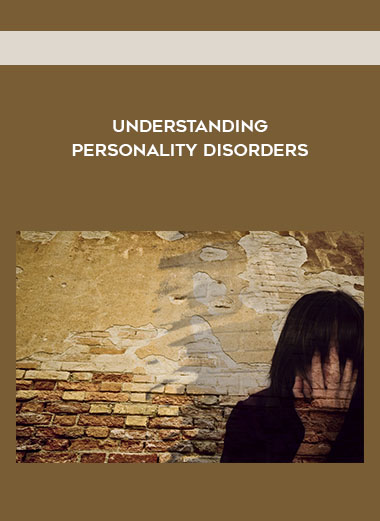understanding personality disorders
understanding personality disorders
Digital Download: You will receive a download link via your order email
Should you have any question, do not hesitate to contact us: support@nextskillup.com
$26.00


Secure Payments
Pay with the worlds payment methods.

Discount Available
Covers payment and purchase gifts.

100% Money-Back Guarantee

Need Help?
(484) 414-5835
Share Our Wines With Your Friends & Family
Description

understanding personality disorders
Chances are pretty good that you already know somebody with a personality disorder. You may not know the name of the problem and, in fact, the person may not even have been formally diagnosed by a medical professional. However, you can’t help shaking the feeling that something is “off”. One of the most serious of all personality disorders is borderline personality disorder; unfortunately, it is also one of the most difficult to effectively treat. However, there are other personality disorders that can wreak havoc on patients and, because of the nature of the diseases, their loved ones. Although symptoms can very from patient to patient, people with personality disorders share both an inability to regulate their emotions and a knack for alienating those closest to them. Many of these patients can be very unpleasant to interact with and are generally not very satisfied with their current circumstances (with some notable exceptions). Sadly, this dissatisfaction seldom improves even if the situation does. Medical professional have been able to determine that personality disorders tend to center around a few major characteristics.
Risk-Averse Personality Disorders
The first category of personality disorders can cause anxiety, fear, and an overwhelming concern for what others think. People with these disorders tend to avoid risky situations in order to stay safe. Affecting as many as five percent of Americans, avoidant personality disorder can cause withdrawal from interacting with others due to feelings of inadequacy. People with this disorder are too afraid of being rejected to have a relationship. The patients seem like social misfits to the outside world. People with avoidant personality types are less likely to succeed in the business world. This category also includes obsessive-compulsive personality disorder. This personality disorder should not be confused with obsessive-compulsive disorder. People with obsessive-compulsive personality disorder make no apologies for it, as opposed to people with obsessive-compulsive disorder who realize something is wrong with them. An inflexible adherence to a schedule, rules or way of doing things is called OCPD. For lack of a better word, many people with this disorder are cheap. People with OCPD are happy with their lives.
“Odd” Personality Disorders
Researchers have found that genetics can play a major role in these illnesses, and the next group of patients seem odder than normal people. The schizoid, schizotypal and paranoid types are personality disorders. Patients with borderline personality disorder prefer to stick to themselves and shun social contact with others. Patients with these disorders often have a different perception of reality than other people. Someone who is paranoid is suspicious of everyone. They are easy to hurt and offended, and reluctant to forgive, even perceived slights. The paranoia results in the patient looking for evidence that their loved ones betrayed them. Five percent of adults suffer from this disorder. These patients are difficult to treat because they tend to place the blame for their problems on others. The distrust inherent in their disease makes it unlikely that they will actively seek out or cooperate in treatment for fear that information revealed during sessions could be used against them. schizoid patients tend to be seen as unapproachable, unlikeable or both. Patients with schizoid personality disorder are not motivated by what others think of them, which results in under performance at work or school. Patients with this disorder shy away from physical contact with other people. Most schizoid people will not seek treatment for the disorder because they enjoy their life. schizotypal patients prefer to be left alone and do not have the ability to interact with others. Unlike schizoid patients, people with schizotypal disorder exhibit strange behaviors and have atypical thoughts. Some of these patients will have delusions of grandeur or even paranoia and, at times, there can be little to differentiate between a schizotypal patient and a schizophrenic.
Dramatic Personality Disorders
Patients with the final type are more unpredictable than those with the odd behaviors. Many of the patients in this group do everything they can to get what they want. A hallmark of this type of illness is that the reactions or behaviors are not usually exhibited on purpose. Although we already use the term antisocial to describe people with what we perceive as social defects, people who are truly antisocial have very specific characteristics that would cause most level-headed people to avoid contact at all costs. Sympathetic people can come off as charming and likable in order to get what they want. Antisocial people don’t care about other people or feel remorse for their actions. They don’t respect the rights of others and don’t feel compelled to follow societal rules. The disorder runs rampant in our current prison populations. People with histrionic personality disorder don’t try to make you believe they are normal. They want to be noticed and they want to look their best. Many histrionic patients come on strong sexually, and have an overly dramatic style of speech and expression. Lack of self-esteem is one of the main causes of histrionic personality disorder. There is a final disorder in this category. One percent of people in the US are affected by the actual disorder of narcissism. This disorder is not related to health self-esteem or ordinary selfishness. Unlike those with histrionic disorder, people with this disorder think they deserve it. They come across as arrogant. If you know someone who has characteristics that span across more than one of these personality disorders, it’s possible that they carry the diagnosis of personality disorder not otherwise defined. Mental health professionals use this label for people who don’t quite fit the formal definition of one of the established disorders, but clearly have problems with emotions and relationships.
OUR BEST COLLECTION OF COURSES AND BOOKS





Reviews
There are no reviews yet.